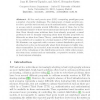783 search results - page 52 / 157 » On security proof of McCullagh |
SP
1998
IEEE
14 years 2 months ago
1998
IEEE
A strand is a sequence of events; it represents either the execution of legitimate party in a security protocol or else a sequence of actions by a penetrator. A strand space is a ...
FAC
2008
13 years 10 months ago
2008
The Mondex case study about the specification and refinement of an electronic purse as defined in the Oxford Technical Monograph PRG-126 has recently been proposed as a challenge f...
CRYPTO
2000
Springer
14 years 2 months ago
2000
Springer
Partially blind signature schemes are an extension of blind signature schemes that allow a signer to explicitly include necessary information (expiration date, collateral condition...
OTM
2007
Springer
14 years 4 months ago
2007
Springer
Ad hoc and peer-to-peer (P2P) computing paradigms pose a number of security challenges. The deployment of classic security protocols to provide services such as node authentication...
SP
2008
IEEE
13 years 9 months ago
2008
IEEE
This paper presents FABLE, a core formalism for a programming language in which programmers may specify security policies and reason that these policies are properly enforced. In ...

